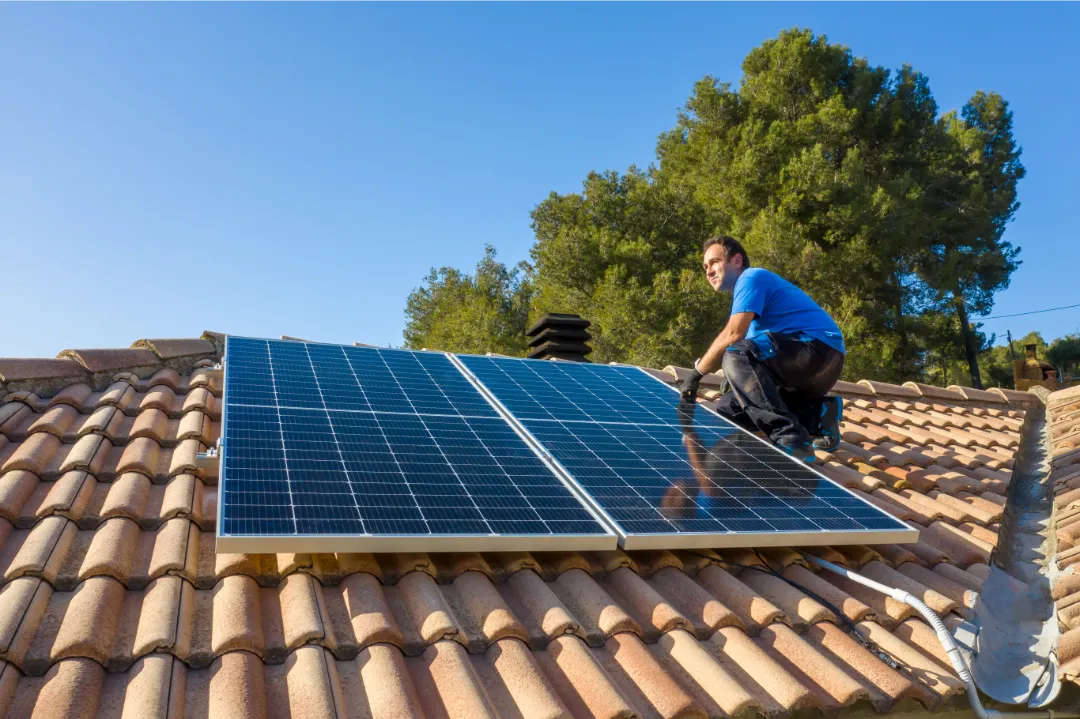PALM HARBOR SOLAR PROS BLOG
Insights from Our Solar Energy Journey

Solar Energy Storage Solutions: Ensuring Power Availability Around the Clock
When it comes to powering our modern lives, we rely heavily on electricity. From keeping our homes lit and our devices charged to running our businesses and industries, uninterrupted power supply is crucial. But what if I told you that there is a solution that ensures power availability around the clock, even when the sun goes down? Solar energy storage systems have emerged as a game-changer in the renewable energy sector, offering a reliable and sustainable way to store excess energy generated by solar panels. But how do they work, and what are the benefits? Join us as we explore the world of solar energy storage solutions and discover how they are revolutionizing the way we harness and utilize the power of the sun.
The Importance of Solar Energy Storage
Solar energy storage is crucial for maximizing the efficiency and reliability of solar power systems. By implementing effective storage solutions, we can address the intermittent nature of solar energy and ensure power availability around the clock. One of the key benefits of solar energy storage is its ability to increase efficiency. With storage, excess energy produced during peak sunlight hours can be stored and used during periods of low or no sunlight. This allows for a more consistent power supply and reduces the need to rely on backup energy sources. Additionally, solar energy storage plays a vital role in reducing costs. By storing excess energy, homeowners and businesses can offset their energy usage during times when electricity rates are higher. This not only saves money but also contributes to a more sustainable and environmentally friendly energy system. Furthermore, energy storage systems can help optimize the overall performance of solar power systems, prolonging their lifespan and reducing maintenance and replacement costs. In conclusion, solar energy storage is an essential component for increasing efficiency and reducing costs in solar power systems.
Types of Solar Energy Storage Solutions
To explore the various options available, let's delve into the different types of solutions for storing solar energy. One popular type of solar energy storage solution is battery storage. Battery storage systems can store excess solar energy during the day and release it when the sun goes down or during periods of high demand. These systems can be integrated with the grid, allowing for seamless power supply and increased reliability.
Another type of solution is pumped hydro storage. This method involves using excess solar energy to pump water from a lower reservoir to a higher one. When electricity is needed, the water is released, flowing through turbines to generate power. Pumped hydro storage is a reliable and efficient option, especially for large-scale solar energy storage.
Thermal energy storage is another viable solution. This involves using excess solar energy to heat a material, such as molten salt, which can be stored and used to produce steam and generate electricity when needed. This method allows for a more continuous power supply, even during periods of low sunlight.
In addition to these storage options, financial incentives play a crucial role in promoting the adoption of solar energy storage solutions. Governments and utilities often offer incentives, such as tax credits or feed-in tariffs, to encourage individuals and businesses to invest in these technologies. These incentives can help offset the initial costs and make solar energy storage solutions more financially viable.
Benefits of Solar Energy Storage Systems
One of the significant advantages of incorporating solar energy storage systems is the ability to maximize the utilization of renewable energy resources. Solar energy is abundant and freely available, but its generation is dependent on the availability of sunlight. By storing excess solar energy during the day, it can be used during periods of low sunlight or at night, ensuring a constant power supply. This not only increases the overall efficiency of the solar energy system but also reduces reliance on traditional sources of electricity.
Solar energy storage systems also offer cost-effective options for energy consumers. By storing excess energy, users can reduce their reliance on grid electricity, which can be expensive, especially during peak demand periods. This not only helps to reduce overall electricity bills but also provides a more stable and predictable source of energy.
Furthermore, solar energy storage systems have a positive environmental impact. By utilizing renewable energy sources such as solar power, we can reduce our dependence on fossil fuels and decrease greenhouse gas emissions. The storage of solar energy allows for a more efficient use of this clean energy source, further reducing our carbon footprint.
How Solar Batteries Work
Using advanced technology, solar batteries efficiently store and release energy generated by solar panels. Solar batteries play a crucial role in maximizing solar energy usage and ensuring uninterrupted power supply.
One of the key advantages of solar batteries is their ability to store excess energy generated during the day for use during the night or during cloudy periods. This ensures that solar energy is available around the clock, even when the sun is not shining. Without solar batteries, any excess energy generated by solar panels would be wasted or fed back into the grid.
Solar batteries work by converting the DC (direct current) electricity produced by solar panels into AC (alternating current) electricity, which can be used to power household appliances and electrical devices. The energy is stored in the battery in chemical form, typically using lithium-ion technology, allowing it to be released and used when needed.
In addition to storing excess energy, solar batteries also help to regulate the flow of electricity in a solar power system. They can smooth out fluctuations in energy production caused by intermittent sunlight, providing a more stable and reliable power supply.
Choosing the Right Solar Energy Storage Solution
When selecting a solar energy storage solution, it is important to consider factors such as capacity, efficiency, and compatibility with your solar panel system. The right choice of battery technology plays a crucial role in ensuring effective renewable energy integration. Battery technology has evolved significantly over the years, providing a range of options to meet different energy storage needs.
Capacity refers to the amount of energy that can be stored in a battery. It is important to choose a solution that can store enough energy to meet your requirements during peak demand periods. Efficiency is another crucial factor to consider. A highly efficient storage solution maximizes the amount of energy that can be stored and minimizes losses during the charging and discharging processes.
Compatibility with your solar panel system is essential for seamless integration and optimal performance. The storage solution should be compatible with the voltage and current requirements of your solar panels to ensure efficient energy transfer.
Additionally, it is worth considering the lifespan and maintenance requirements of the storage solution. Long-lasting batteries can provide reliable energy storage for years to come, while low-maintenance options reduce the need for regular upkeep.
Installation and Maintenance of Solar Energy Storage Systems
Installing and maintaining solar energy storage systems requires careful planning and regular upkeep to ensure optimal performance and longevity. The installation process can present some challenges that need to be addressed for a successful outcome. One of the main challenges is determining the suitable location for the solar panels and storage system. Factors such as sunlight exposure, shading, and available space need to be taken into consideration. Additionally, the electrical system must be properly configured to accommodate the storage system and ensure seamless integration with the existing infrastructure.
To overcome these challenges, it is essential to follow best practices during the installation process. This includes conducting a thorough site assessment to identify any potential obstacles or limitations, such as shading from nearby buildings or trees. Proper grounding and wiring techniques should be employed to ensure safety and optimal system performance. It is also crucial to use high-quality materials and components to minimize the risk of system failures and maximize the overall efficiency.
Maintenance is equally important to ensure the longevity of the solar energy storage system. Regular inspections should be performed to identify any issues or anomalies that may affect performance. Cleaning the solar panels periodically to remove dirt and debris can help maintain their efficiency. Monitoring the system's performance and keeping track of battery health is also crucial for early detection of any problems. In case of any malfunctions or breakdowns, timely repairs and replacements should be carried out to prevent further damage and ensure uninterrupted power availability.
Future Trends in Solar Energy Storage
We anticipate exciting advancements in solar energy storage technology. The future trends in solar energy storage are driven by both technological advancements and government policies promoting renewable energy.
Technological advancements in solar energy storage are focused on improving the efficiency and capacity of energy storage systems. One trend is the development of advanced battery technologies such as lithium-ion batteries, which have higher energy density and longer lifespan compared to traditional lead-acid batteries. Another trend is the integration of smart grid technologies with solar energy storage systems, enabling better management and optimization of energy flow.
Government policies play a crucial role in promoting solar energy storage. Incentives such as tax credits and subsidies encourage individuals and businesses to invest in solar energy storage systems. Governments are also implementing regulations that require a certain percentage of energy generation to come from renewable sources, which further drives the adoption of solar energy storage.
Furthermore, research and development efforts are underway to explore innovative storage technologies. These include advanced materials like graphene, flow batteries, and even using renewable energy to produce hydrogen as a form of energy storage. These developments hold the promise of even greater efficiency, scalability, and cost-effectiveness in the future.
Conclusion
In conclusion, solar energy storage solutions play a crucial role in ensuring power availability around the clock. With various types of storage systems available, such as solar batteries, the benefits are immense. By choosing the right solution and ensuring proper installation and maintenance, individuals and businesses can harness the full potential of solar energy. As the industry continues to evolve, future trends in solar energy storage are promising and hold great potential for a sustainable and reliable energy future.
Connect With Us
Locations We Serve:
© Copyright 2026 Palm Harbor Solar Pros. All Rights Reserved.
Terms & Conditions | Privacy Policy

